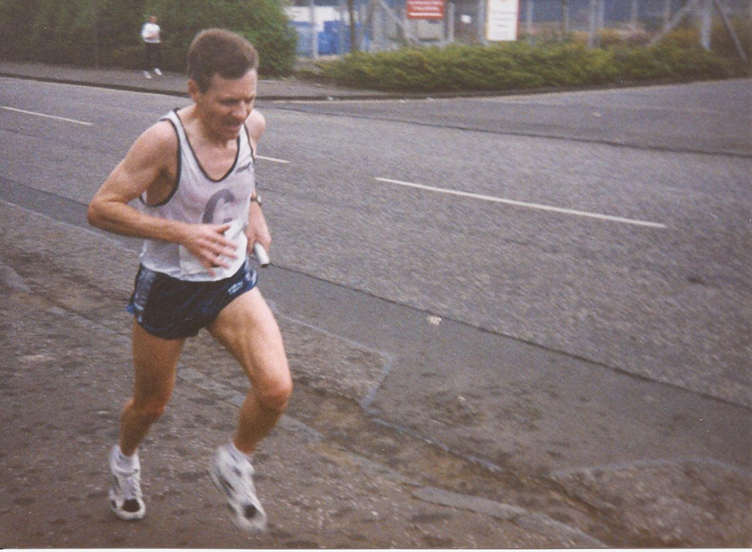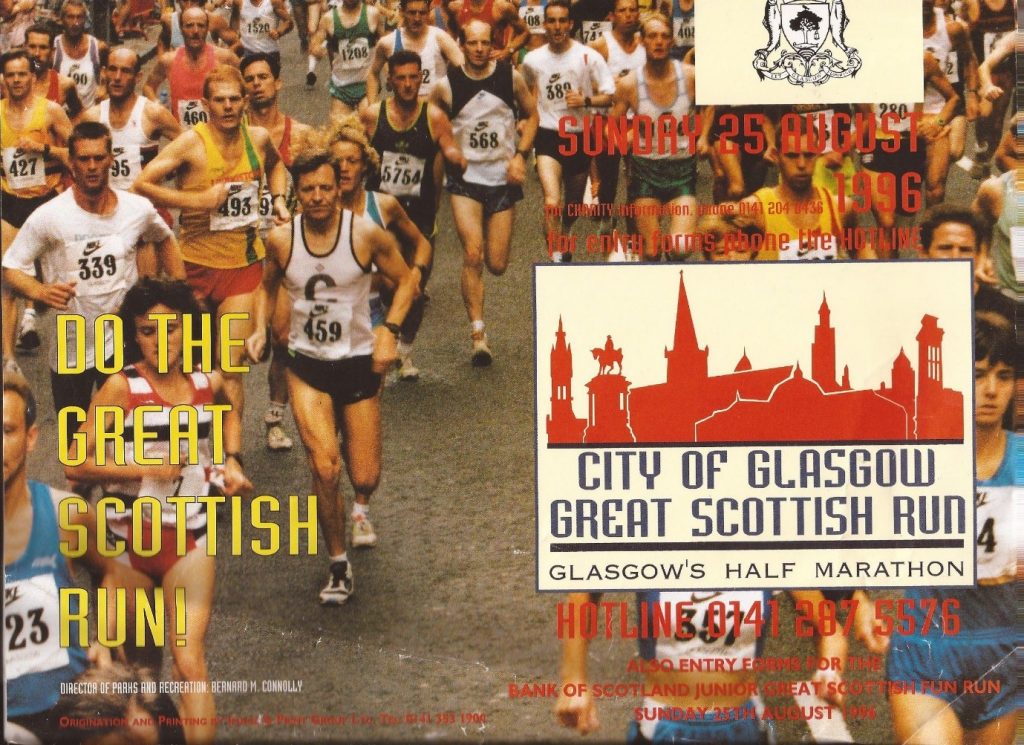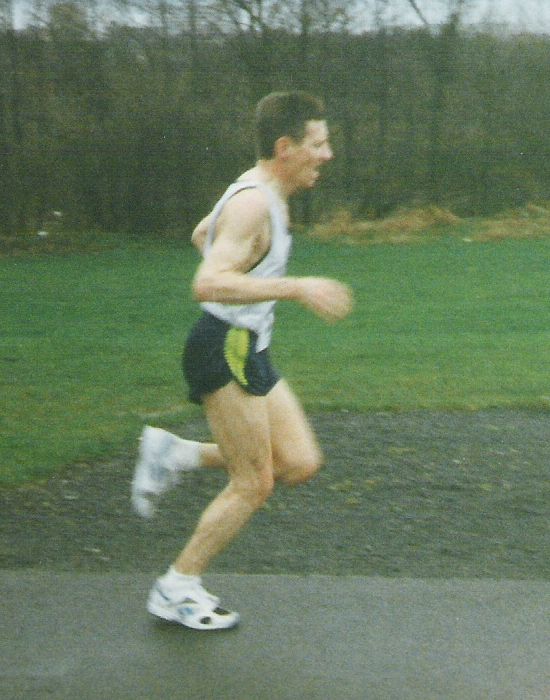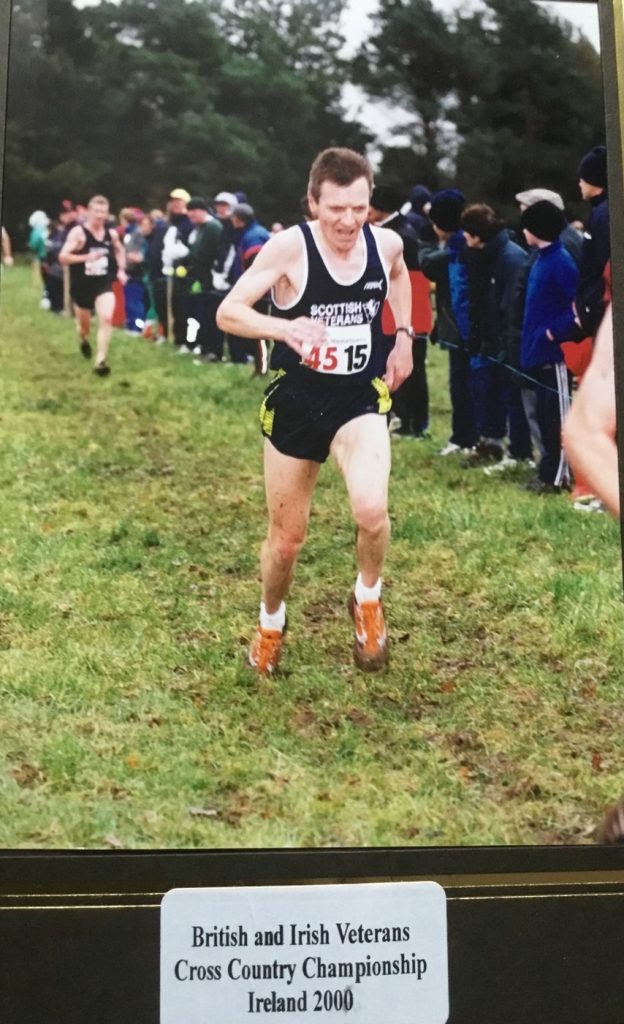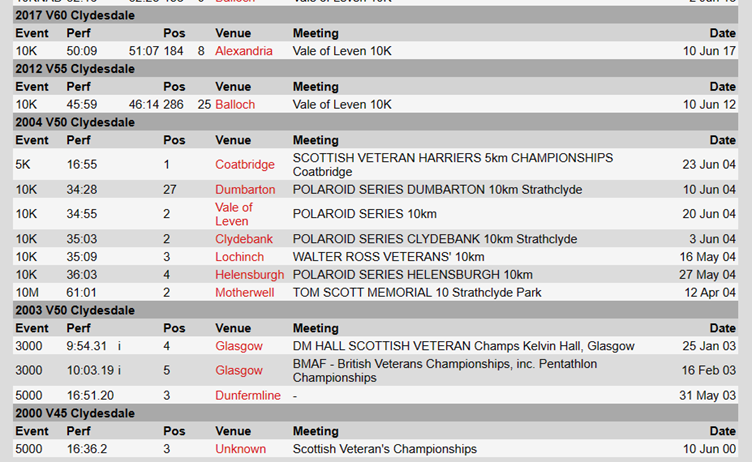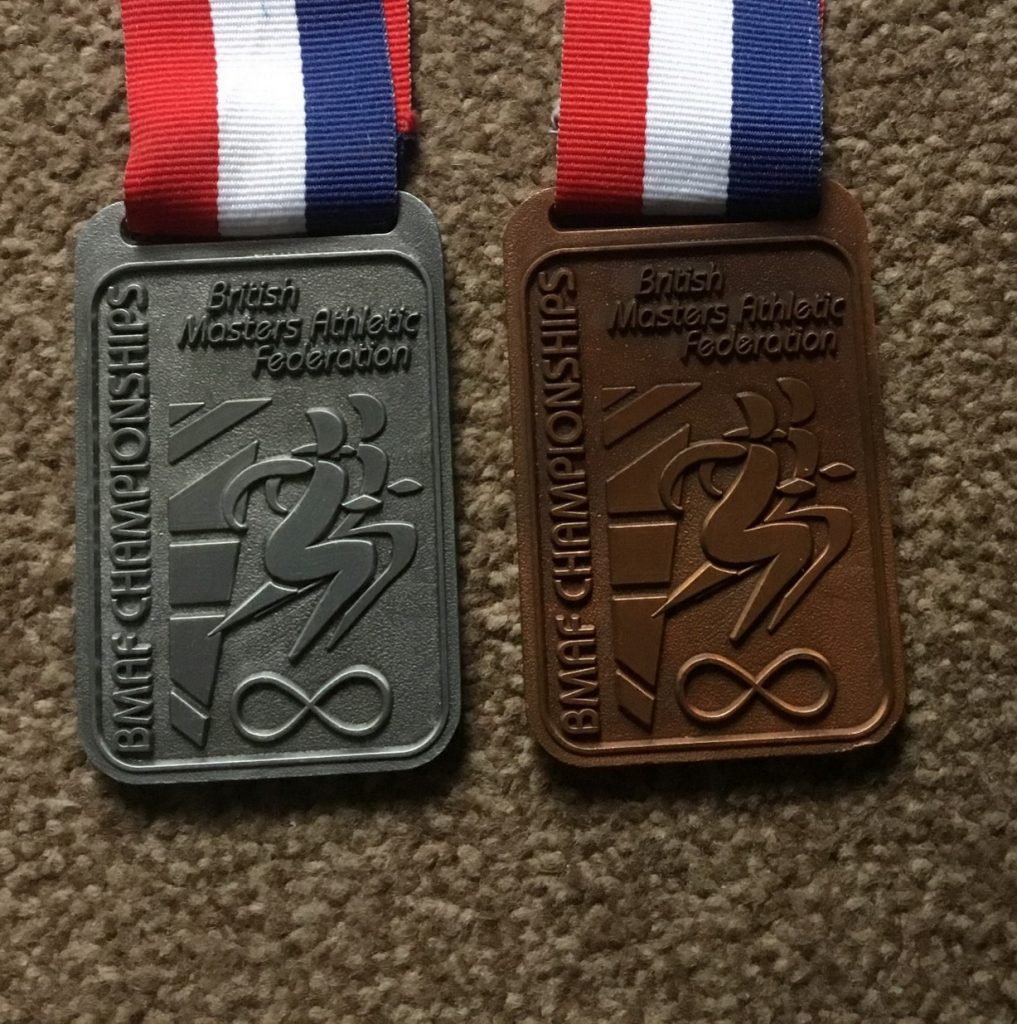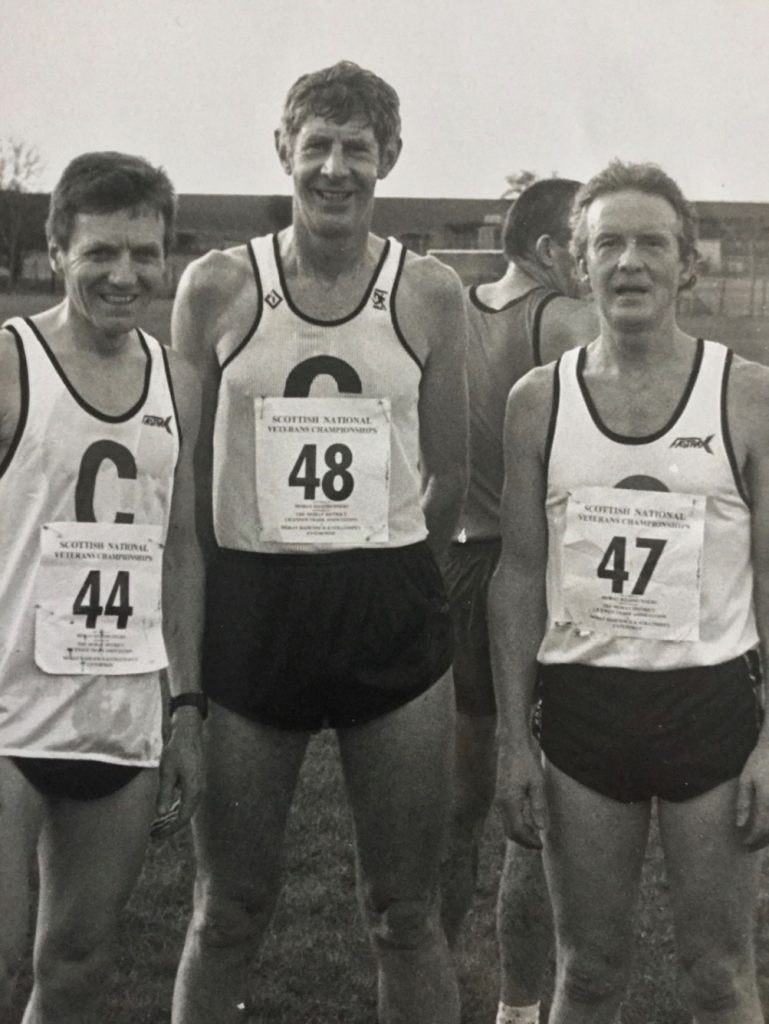John Hanratty running in the Edinburgh to Glasgow Relay
There were many who came into running via the ‘running boom’ of the 1970’s and 1980’s. The first ever Glasgow People’s Marathon was held in 1982 and brought hundreds into the sport. John was one of them , his first race was in ’84, and unlike the vast majority he went on to run distances up to the marathon on the roads, he ran on the track in 5000m, 10,000m and steeplechase, and ran in every cross-country championship – club, county, District and National – for which he was qualified and he ran in championships on all surfaces as well as in international teams as a veteran runner.
Asked about previous sporting involvement, John tells us that “I was in the Clydebank Sea cadets, TS Queen Elizabeth, for about 6 years, where I became an instructor cadet, many a weekend was spent sailing dinghies at HMS Lochinvar under the Forth bridge, great time. Like most boys I played football but wasn’t very good.”
Why did he come into running in the first place? “I watched Peter Fleming win the Glasgow marathon in 1983, decided to give it a go and joined the harriers soon after that.”
The Glasgow Marathon, after three years as an elite international race over four laps of the city became a people’s marathon, a mass marathon that attracted thousands into the sport and it was in 1983 that Peter Fleming won the race in 2:17:46.
Having been inspired by that run, and of course the race publicity machine which was in full swing then, John, who was 32 at the time, joined the Harriers with his application form going through on 10th January, 1984. Unlike most Harriers, he was not brought along by a friend or acquaintance but just went down to the club’s winter headquarters at Bruce Street Baths and that was it. Later that year, John was at the start with 10, 702 other runners with the 10 Miles Tom Scott Memorial Road Race as his longest race before that. The Glasgow Herald estimated that more than a quarter of a million spectators, bands and dancers turned the city into a carnival. John was 236th at the finish with more than 10,000 runners behind him. Not a bad debut at all for the newcomer.
He ran in three more Glasgow Marathons all of which were in very good times indeed. More important, he finished further up the field every time he ran. The weather may change from year to year affecting the times, but the fields are no less competitive, and that is nowhere more true than among the real club runners. John’s consistency however is remarkable.
| YEAR | POSITION | TIME |
| 1984 | 236th | 2:47:23 |
| 1985 | 73rd | 2:32:39 |
| 1986 | 44th | 2:33:16 |
| 1987 | 33rd | 2:32:58 |
Not satisfied with running well in Glasgow, he travelled to Fort William and ran in the Lochaber Marathon twice finishing in times of 2.35 (1986) and, in 1989 he ran 2.37.19 to be sixth finisher and first non-veteran across the line. In one of them, he recalls getting terrible cramp in the last mile and stopping to recover.
John featured prominently in this poster for the Glasgow Half Marathon in 1996.
He always ran well on the roads and turned out for the club in –
*The Edinburgh to Glasgow Eight Stage Road Relay 10 times between 1984 and 2002 when it ceased to be an event. He ran seven of the eight stages, missing only the fourth leg.
*The National Six Stage Road Relay 16 times between 1985 and 2004 and ran every stage at one time or another.
John ran in teams with runners of all abilities including Scottish internationalists Allan Adams, James Austin, Ewan Calvert, Phil Dolan, Grant Graham, Kheredine Idessane Billy Jenkins, Ian Murphy, Brian Potts, Graeme Reid, Des Roache and others.
He also has the distinction of winning the first ever Polaroid 10K Road Race on Sunday, 1st October, 1987, which started in Christie Park.. The Polaroid 10K races were sponsored by the Polaroid factory in Dumbarton and consisted of 10K races in Clydebank, Dumbarton and Helensburgh and were popular among club runners of all abilities particularly from the West of Scotland. John thinks that this was his best road race, running all the way with the leading pack, he saw an opportunity to take the lead and made his break to victory.
The result was 1. J Hanratty (Clydesdale Harriers) 32:25; 2. R McCulloch (Bellahouston) 32:37; 3. M Gormley (Scottish Marathon Club) 32:49. Like many runners he returned to the race – and to others in the Polaroid series – year after year including the last to be sponsored by Polaroid in 2017 when as a V60 he ran 50:09.
John ran in all the classic road races in the country with very good results. His best half marathon was at Livingston where he ran 69.59. He didn’t run the Tom Scott 10 miles road race very often and his best time was 55:57 in 2003 as second placed V50. He also ran in the Balloch to Clydebank, the Nigel Barge Memorial Road Race in January and the Glasgow University Race in November as well as the McAndrew Relay every October. 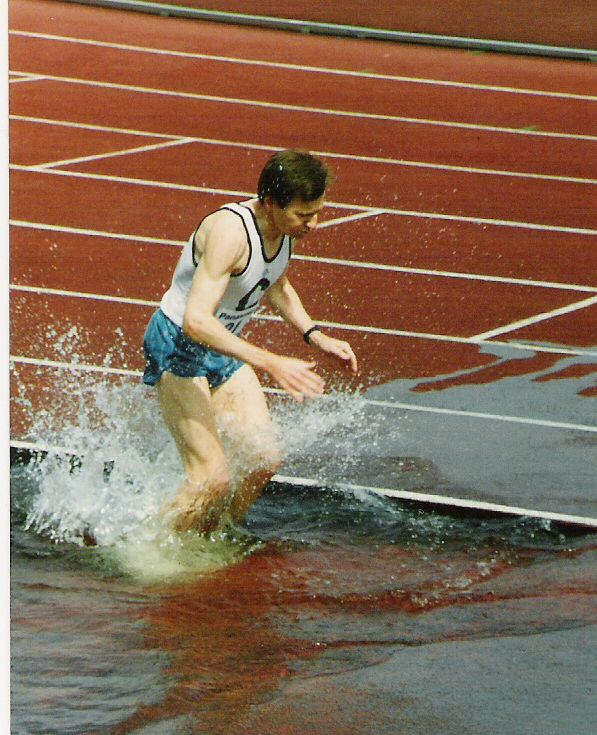
Having joined the club, as noted above, in 1984 and having represented it on the roads and over the country in relays and championships, at club, county, district and national levels, he turned his attention to the track in 1986 and competed in the Scottish Athletics League for the first time.
As a competitor he ran
- in the 5000m in 1986, ’87, ’88, ’89, 90, ’92, ’93, ’95, ’98 and ’99;
- in the steeplechase in ’89, ’90. ’91, ’93, ’94 and ’95;
- in the 10,000m in 1990, ’91, ’93, ’94 and ’95.
Valuable as these runs and the points they earned for the club were, and they were very valuable, he was also responsible for most of that time in selecting the runners for the three distance events and ensuring their appearance at the venue. He set the example himself by doubling up the 5000m and steeplechase at the same match fairly often. Never afraid of taking on additional tasks, John was club captain for many years after only a few years in the club. He took his responsibilities seriously and could be seen helping to mark the track at Whitecrook for club championships, or putting out and taking in the course markers for cross-country races. He himself says that of all the captain’s duties, “Waiting to put teams in for the relays on the day was nerve racking and must have affected my own race”. Maybe it did affect his own race but it did not show in the results column.
John was maybe seen at his best over the country and he says quite clearly that cross-country was his favourite event.
John in the Veterans’ International in Meath, County Cavan, Ireland in 18/11/2000
John had an outstanding career as a veteran runner winning international honours over the country and more will be said about that below but again his running as a club member was notable. He won the Dunbartonshire Cup for the first club man home in the Balloch to Clydebank road race in 1985/86 and the DJ McGinley Trophy for the first veteran in the club championship in 1992/93, 1994/95, 1998/99, 1999/2000 and 2000/2001.
He has run in every race imaginable – club, district, national championships, district and national relays – and all over Scotland on all the classic courses – Hamilton, Falkirk, Bellahouston, Jack Kane Centre in Edinburgh – as well as at many local venues.
A very consistent athlete and always a good team member. In the top event of the winter, the National Championships, he ran 18 times in 19 years between 1987 and 2005 in teams that finished between 6th and 21st, and was in the club’s first four counters 14 times, with a best club position of 2nd on 6 occasions. In the National Four Stage Cross Country Relay Championship, his first run was in October 1985 at St Andrews where he ran on the second stage in the B team (the club had four teams out that afternoon). The Power of 10 website has listed John’s races since 2000 and they are impressive.
Note the number of first, second and third places in the table. The Run Britain website give additional information, below, about his GB position over the same period using the above information..
| EVENT | AGE GROUP | YEAR | POSITION |
| 3000m | V50 | 2003 | 15th |
| 5000m | V45 | 2000 | 12th |
| 5000m | V50 | 2003 | 7th |
| 5K | V50 | 2004 | 15th |
| 10K | V50 | 2004 | 17th |
| 10 Miles | V50 | 2004 | 64th |
From the British Masters at Irvine 12/4/2003 where John finished 3rd in his age group and with Bobby Young and Peter Cartwright taking second team for Clydesdale Harriers
*
Colin Youngson, himself a superb runner, has written the following appreciation of John as a veteran runner.
JOHN HANRATTY AS A VETERAN ATHLETE
by Colin Youngson
“John ran for Clydesdale Harriers, Scotland’s most historic club. He first appeared aged 40 in the 1993 Scottish Veteran Cross Country Championships at St Andrews, when he finished a respectable 22nd, while I was fifth and first M45.
As the years passed, he proved admirably consistent: improving to 9th in 1994 (Troon). He was a strong 12th in 1995 (Stirches, Hawick).
Shortly afterwards, the 1995 British Veterans Cross Country Championships were held over Beach Park, Irvine. I was very pleased to finish 16th and first M45, but John Hanratty was only fifteen seconds behind, in 21st place, and an excellent fifth Scot on the day, due to the English invasion.
Our Scottish Veteran/Masters cross country friendly but close rivalry continued: he beat me for the first time in 1996 (Elgin – 12th to my 15th); and subsequently in 1999 (more details below); 2000 (Cumnock, 14th and fourth M45); 2001 (Aberdeen – 19th); and 2003 (Forres – 26th).
However, I ‘got’ him in 1997 (Edinburgh – John was 23rd); 1998 (Troon – 16th and sixth M45 to my 12th and first M50); 2002 (Glasgow – he was 28th to my 24th). Our last such encounter was in 2004, over a hilly monster at Cupar, when he finished 63rd shortly after I collapsed over the line 52nd and first M55.
Therefore, tough, consistent, modest John Hanratty raced the Scottish Veterans XC 12 years in succession.
His best performance in the event was on 27th February 1999, in horrendous conditions over the Stirches course in Hawick. Let that great athletics journalist, Doug Gillon, set the scene with excerpts from his Glasgow Herald report.
“Storm-lashed hailstones scourged runners like a medieval penance” … “Rough sheep pasture, with a grinding half-mile hill, and muddy descents, was not for the faint-hearted, yet it brought not one moan from the vets. If this had been an open championship, younger wimps would have been bleating in complaint.”
I can add that paths were very slippery, there were several fallers, and that tactics were essential, since during one long section of each lap, we had to battle an incredibly fierce gale. Consequently, joining a small group and sheltering behind was sensible. Suffice it to say that this formidable Stirches course, which John Hanratty had relished in 1995, suited him very well. After the big uphill, when we turned into the gale, he was two groups in front of me – and held on for 12th place (securing a bronze medal for third M45), while I was 17th and first M50 by six seconds from my old friend and redoubtable harrier George Meredith.
In the 1998 British and Irish Cross Country Championships, at St Asaph, Wales, Archie Jenkins won M45 bronze again, leading his team (John Hanratty 11th, Andy McLinden 12th and Barney Gough 13th) to silver medals. This was John’s first international vest for Scottish Vets.
In the 2000 British and Irish Cross Country Championships at Navan, County Meath, Ireland, John finished 52nd, 19th M45 and fourth counter in the team, which just missed out on team medals in fourth place, in front of Northern Ireland.
John must have enjoyed racing at Dumfries in the 1998 Scottish Veterans Athletics Championships, winning a gold medal in the 1500m (4.23.90) and narrowly losing to Archie Jenkins but securing silver in the 5000m (16.08.77).
John Hanratty of Clydesdale Harriers was well-liked and very well respected, especially as a fine cross-country competitor. “
With Brian Edridge (48) and Jim Shields (47) at Veterans’ National in Elgin, 24/2/96
